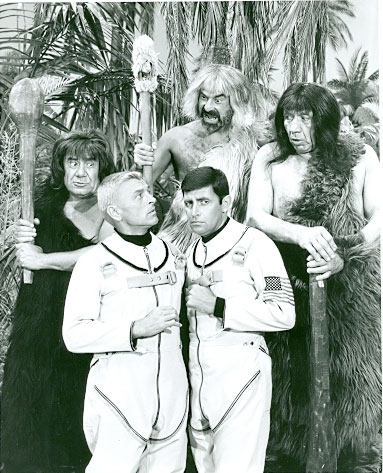Over at the Crazy 8 Press website, my fellow authors and I (try!) to blog on a regular basis about…well, all kinds of stuff. For December, we all wrote about television science fiction programs. In case you’re not a regular habitué of said blog (and why aren’t you?), here’s what I, Mr. Pee-In-The-Pool, had to say on that subject…
The theme for this month’s blog posts by Crazy 8 authors is a look at television science fiction. The problem is, other than Doctor Who and the occasional Outer Limits or Twilight Zone rerun, I don’t watch any science fiction shows on TV…and please don’t bother recommending any to me, thanks all the same. The genre pretty much lost me after the clusterfornications that were Lost and Heroes. Why was I investing my time and sympathies with shows that didn’t know quite what they were or where they were going and would inevitably disappoint? So I save myself the aggravation and growling at my TV by just not watching it to begin with. My recent dip into Agents of S.H.I.E.L.D. has confirmed the wisdom of that decision.
The problem I’ve always found is that the people producing science fiction TV shows aren’t usually very knowledgeable about science fiction. If they had ever read science fiction, it was probably back when they were kids. But seeing as they’re TV producers, it’s more likely their concept of science fiction was gleamed from the movies and television shows they watched growing up…produced by people who also weren’t very knowledgeable about science fiction. It’s like the way a friend described J.J. Abrams’ take on Star Trek, “It’s as though he heard a capsule outline of the original series as described by someone who watched it in 1967 and based his interpretation on that. Everything is more or less there, but it’s just not quite right.”
To TV and film producers, science fiction is just another medium, along with cop shows, forensic shows, medical and legal dramas, etc. Another example from Star Trek is the famous story of Gene Roddenberry’s use of the line “Wagon Train in space” in his pitch to the networks. For better than a decade, Westerns had been the most popular thing on the tube, so Roddenberry’s pitch line was an obvious descriptor for his show, and if’n you think about it, pardner, wouldn’t’a been so hard to transpose the Star Trek concept to a Western setting, the Enterprise swapped out for a railroad train with a company boldly going to lay tracks where no Europeans have gone before. Or as a period naval drama seeking out new civilizations during the age of exploration. It just shows the interchangeability of backdrops for a lot of ideas in the minds of TV producers.
Of course, what they–i.e. the producers and creators of TV “sci-fi”–consider science fiction is to us–i.e. longtime/lifelong readers of science fiction and even somewhat aware of the history of the genre–a joke. Even my print science fiction aficionado friends who watch televised science fiction and profess to enjoy much of it still spend more time tearing it apart for its lack of verisimilitude to “real” science fiction than praising it for its own merits. Fortunately for the producers, however, the True Fan is, other than as annoying creator of anti-buzz on the internet, irrelevant to the program’s bottom line. The True Fans’ numbers are too small to make a difference to the ratings (or box office) and, besides (Spoiler Alert!) they usually watch the shows anyway, if only to be able pick them apart so they’ll have something to complain about on Twitter…as if the Neilsen Ratings can distinguish between viewers who are tuned in because they like the show or out of sheer spite.
But what I want to see on the screen as a lifelong reader is what I’ve been reading all my life. A miniseries based on Isaac Asimov’s Foundation trilogy? Bring it on! Except…do you know how dull that would be? Asimov’s books were largely talk and thought and, while there may be an exciting way to film it, it’s beyond my meager imagination to figure out how. I’d watch it if someone else solved the puzzle. But how many mainstream viewers would last through the first hour? TV and cinematic science fiction is designed to be a kind of shorthand version of the real thing, built with a general audience to whom “sci-fi” means ray guns, spaceships, and aliens in rubber masks in mind. Old timey non-SF conversant TV viewers remember contemporary programs like Star Trek and Lost In Space with about equal weight. Both were labeled science fiction. But then again, so were The Jetsons and It’s About Time.
So I’m not the right person to ask for my views on the latest “sci-fi” on the tube. I don’t think it’s gotten everything wrong–I call the iPhone my “Star Trek communicator,” their “replicator” has become fact with current-day 3-D printers, and, let’s face it, The Jetsons called a lot of things right about the civil and social applications of science, albeit draped in cartoonish trophs, like turning the fully-automated home into the character of Rosie the Robot-Maid–but enough so that I have, as I said, decided to opt out. Except, as I say, for Doctor Who. But that’s just the exception to my rule.
Tags: Crazy 8 Press, It's About Time, science fiction, television, The Jetsons
